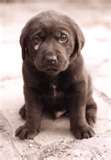Depression in Dogs
Despite what some people may say it is very real and can affect any dog
Depression in dogs is very real and most likely will affect your pet at some point in their lifetime, much like depression affects all humans at one point or another.
Dogs are absolutely no different, but in several cases there may be a very fine line of whether your dog is actually depressed or has a medical problem developing.
For this reason, it is very helpful for any dog owner to have at least an idea of some of the potential causes, symptoms, as well as the various treatments that are available for depression.
CAUSES OF DEPRESSION IN DOGS
The symptoms of depression in dogs will of course depend on the actual personality of your dog, but there are very common causes that will affect almost every dog.
The most common causes of depression in your pet will be the loss of another dog in the household or the loss of their owner.
 Depression in dogs best treatment is alot of love
Depression in dogs best treatment is alot of loveDogs by their very nature are meant to be in a natural pack with other animals.
If your dog has had a longtime companion it will be very hard losing that friendship.
They have literally shared everything for a very long time and just like a human losing a very close member of the family.
It will be extremely stressful for your dog.
For this reason, if at all possible, it is recommended that you get another dog as quickly as you can.
It may take a few weeks for your dog to become familiar with their new friend, but they should return to normal within weeks.
Losing or changing their owners for a myriad of reasons is also very stressful for a dog.
There is a very strong bond that has developed in most cases and the owner is the only thing the dog has ever known.
Moving to a new house or new surroundings can also cause depression in dogs, as well as a new addition to the family.
If your dog is a single pet and a new baby arrives, it is a natural reaction simply because they are no longer the center of attention.
Separation anxiety can also cause depression in dogs, especially if your pet is not used to it.
We think of dogs as our best friends and loyal companions, but to them we are their entire life and reason for existence.
If you are going to be gone for a while, keeping your dog at least in the same surrounding if possible will help.
Placing them in a kennel is sometimes the only alternative, but you can image what must be going through their minds when this happens.
Bad weather or the complete lack of exercise may also trigger depression in your dog. All dogs, regardless of their size or age, love to go outdoors and run and play.
If you live in an area with an extended period of bad weather, it is really no different than what people refer to as cabin fever.
THE COMMON SYMPTOMS
Depression in dogs, when it does occur, will show you several symptoms.
However, you should always have your dog checked by your veterinarian to make sure that it is not a medical condition that may be developing.
The first symptom that most any owner will see with depression in dogs will be a change in the eating habits.
Again, the similarities with people are quite common, as your dog may start to eat to extremes and acting as if they are never full and always hungry.
Or, they may do just the opposite, and become very fussy and only nibble at their food. If your dog does stop eating, they will most likely also stop drinking.
Weight loss in dogs is very uncommon, as well as very unhealthy, unless it is intended.
It should be watched very carefully as it can very quickly lead to dehydration which can have catastrophic results.
If your dog suddenly starts to shed excessively or loses patches of hair, they are doing so because of the loss of nutrients in their system.
The next symptom will be very low energy levels even in the most spirited of dogs.
If this occurs, it will seem like no matter what your dog does, they will show almost no enthusiasm at all.
Depression in dogs will also cause your dog to suddenly want to be left totally alone.
The normal very loyal dog will suddenly start to wander into a quiet room, or in some cases, may even start to hide.
One of the telling signs that your dog is depressed is this symptom, especially if they refuse to move their heads when you call them or walk into the room.
ANXIETY IS ALSO A FACTOR
Anxiety is yet another possible symptom of depression and you will know this sign when you see it.
Your dog will jump at the slightest of things, and they will pace and look to be unable to find any place in your home where they are comfortable.
One of the signs of this form of depression is your dog following you everywhere, but still does not seem to want to interact.
Dogs are notorious for following their owner, but not interacting is a real warning sign.
But there is one final symptom that is a real warning sign of depression, and that is aggression.
If your dog has always been very mild and even tempered and suddenly becomes aggressive and snips or growls, it may be time to seek treatment for the depression they are going through.
THE TREATMENTS BEGIN WITH LOVE
Treatments for depression in dogs all starts with some extra tender loving care with your dog.
If the cause of the depression is the death of their companion, if it is possible, bring another dog into the household.
Adopting a dog from a shelter has many advantages, but this will be a huge advantage for both dogs.
The adopted dog is most likely depressed for many of the same reasons and together you may see even a stronger bond develop.
One thing an owner should not do is reward your dog for anything if they stay depressed.
Reward them instead for positive behavior.
Simply taking them for a ride or a short walk and then rewarding them for something positive will bring most dogs back to normal in a very short period of time.
 Your friend just wants you
Your friend just wants youEven something as small as a tail wag or an alert gesture is a very positive sign and should be rewarded.
But if there is nothing else that seems to work, there are medications that you can give to your dog, and you might want to discuss the situation in detail with your veterinarian.
The same depression medications used for humans can be used for dogs and they will include Prozac, Paxil, and Zoloft.
There is also an FDA approved drug used for separation anxiety in dogs called Clomicalm.
Although these should only be used in the toughest of cases, depression should be treated if you can afford it before in becomes too severe.
Summary
Depression in dogs is very real and will happen to all dogs at some point in their life. The degree of the depression, in most all cases, can be corrected with a lot of love.
If you have adopted a pet, it will be very important to keep depression in mind when they first enter your household.
If you where abandoned or left without the only thing that you ever loved, it would be just as depressing; and a dog is no different.
Pet Medications for Depression in Dogs
Dog Vitamin Store
Emergencies in Dogs








